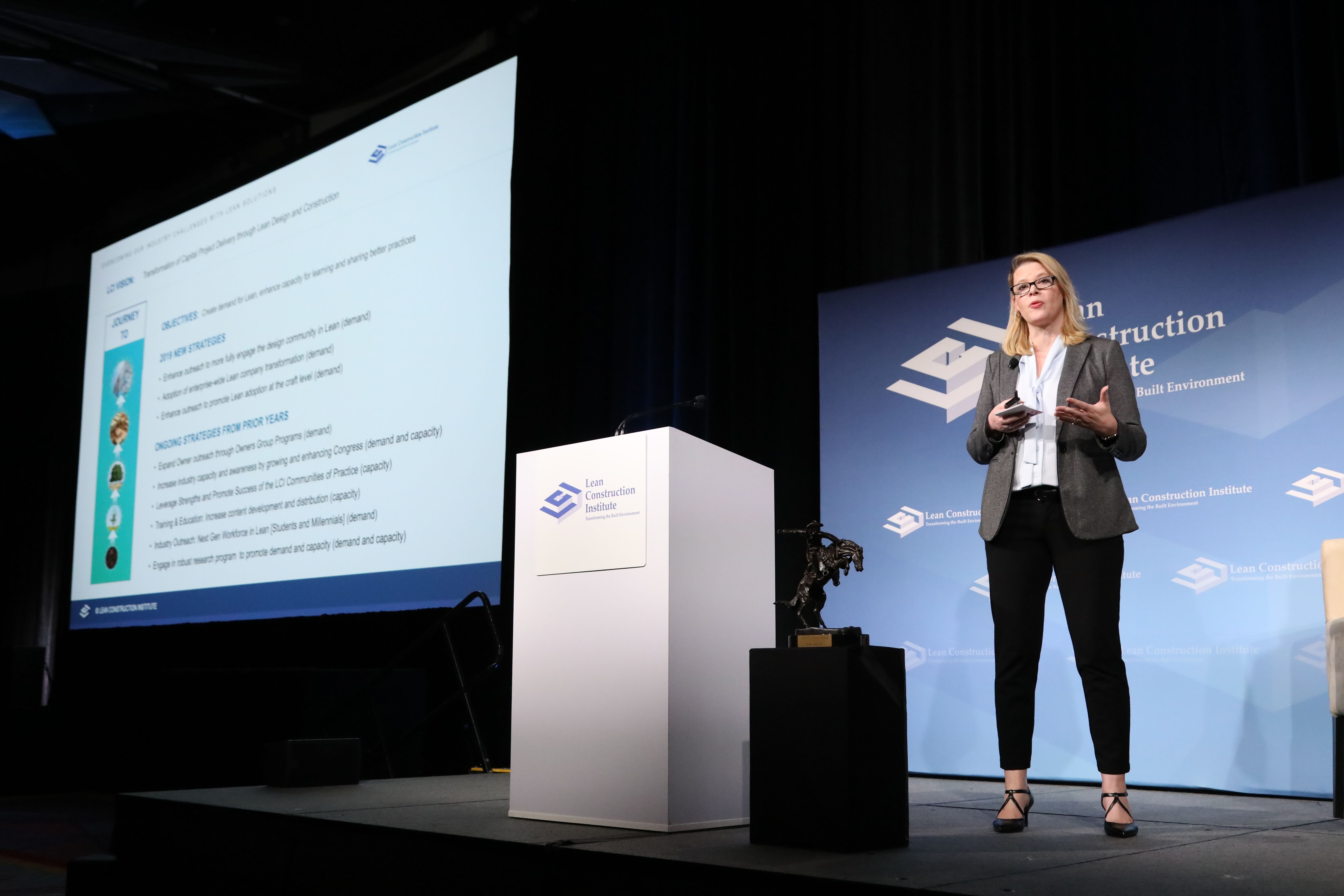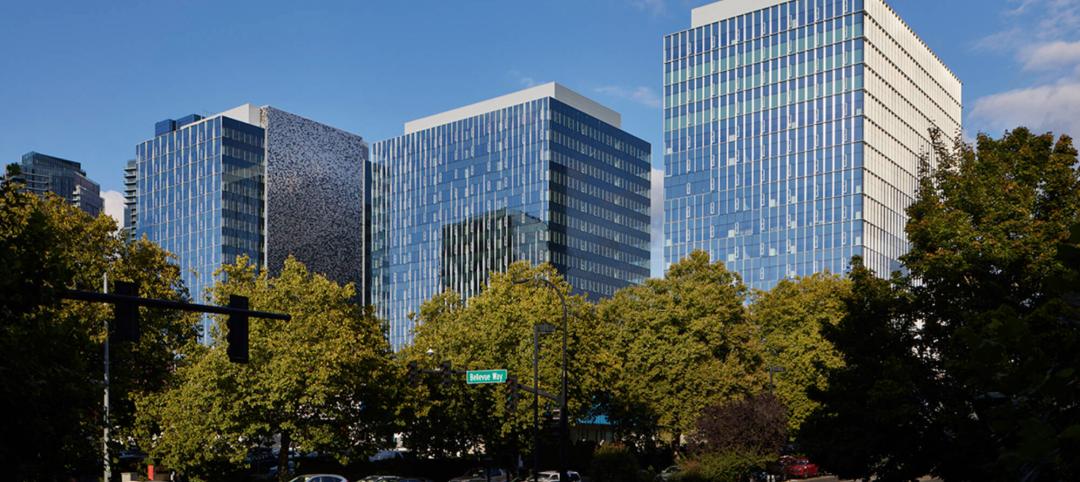The building design and construction industry must embrace change now. Stresses with finding talent, budgets, schedules, and the needs of clients call for change in approach. Companies are looking not only at how we work, but how we work with others.
My role as Chief Process Officer at HKS has allowed me to take a critical look at our operations within the firm, how we embrace our role in the design process, and how we set up our talent for success. This year, I combined that role with chairing the Board of the Lean Construction Institute, which allowed me to have conversations about the industry while tackling those same conversations within the firm.
The 2019 Lean Construction Institute Congress, held in Fort Worth, Texas, Oct. 14-18, was attended by more than 1,600 owners, architects, consultants, engineers, constructors, and trade contractors. LCI Congress featured more than 30 educational sessions and 75 presentations focused on Lean in the design and construction industry. I attended many of these sessions and offer the following takeaways, all of which focus on how we build stronger teams and contribute more value to our clients:
• More is not more: The opening keynote was not from a well-versed-in-Lean evangelist. Greg McKeown, author of Essentialism, The Disciplined Pursuit of Less, spoke about the power of less but better. He challenged us with these simple steps:
1. Explore. What is something essential for you right now that you are under-investing in?
2. Eliminate. What is something nonessential that you are over investing in?
3. Execute. How can you make it as easy as possible to transition the time you spend to the essential things?
Lean thinking encourages teams to add value (essential) by eliminating waste (non-essential) from all work efforts. McKeown’s insight can help us recognize and identify simply what is easy for us to do—take on more that is nonessential. As part of a team, agree together on what is essential and nonessential, get consensus, and build more value.
• Integrate evidence-based design through Lean thinking: Lean encourages value-based decision making with an all-team collaborative work environment. Evidence-based design reinforces the idea that we should be making decisions built on proven research. Using Lean methods for research, understanding customer needs, and applying the EBD research to solve problems is a pairing that maximizes the team’s efforts.
• This is a humble place—leave your egos at the door: The LCI Congress is a unique gathering of owners, designers, developers, project coaches, contractors, and trade contractors to discuss what worked and what didn’t with their projects. They share their mistakes—and how to fix them—even with competitors. The same for project teams. Multiple case studies presented their project stories, discussing their successes and failures. Teams represented different companies and disciplines of work but talked as one unit. The overall message: To effectively solve problems we must use our expertise, not our egos.
Also see: Movers + Shapers Report - Lean and Mean
• We are here to learn: Mike Staun, formerly with Proctor and Gamble, talked about the most pressing challenges in construction today and how Lean IPD can solve them. Stan Davis and Shernette Kydd with Cook Children’s Medical Center talked about strategic thinking with both healthcare project delivery and healthcare delivery. Merck’s journey, told by George Cusick, focused on growth demands based on customers’ needs and how working with Tier 1 construction partners helped meet those needs. No one claimed to have all the answers, but they all wanted to learn.
• Building relationships is the key: Our projects serve a greater purpose; they serve communities and the people in them. Engaging with the community for a purpose bigger than ourselves is an easy way to build strong relationships on teams. Teams that have strong relationships and Lean cultures of improvement can openly tackle problems and find innovative solutions. And they perform better.
• Mental health is a construction industry issue: Building design and construction can be a stressful profession. Statistics shared at the Congress showed that the construction suicide rate is four times the national average and is the leading cause of construction fatalities. The decline in talent entering related fields, the stress of budgets and schedules, and increased expectations add to those strains. We should watch out for our team members and the warning signs of depression, and encourage them to get help.
• Have fun: Whether it was in the Advanced Practitioners session, where industry leaders shared ideas, or in individual presentations, bringing back the fun was a common theme at LCI Congress. Developing a strong bond with your project team, regardless of your background, allows you to solve conflicts and still have fun.
Related Stories
AEC Tech Innovation | Oct 8, 2024
New ABC technology report examines how AI can enhance efficiency, innovation
The latest annual technology report from Associated Builders and Contractors delves into how artificial intelligence can enhance efficiency and innovation in the construction sector. The report includes a resource guide, a case study, insight papers, and an essay concerning applied uses for AI planning, development, and execution.
Healthcare Facilities | Oct 8, 2024
Herzog & de Meuron completes Switzerland’s largest children’s hospital
The new University Children’s Hospital Zurich features 114 rooftop patient rooms designed like wooden cottages with their own roofs. The project also includes a research and teaching facility.
Mixed-Use | Oct 7, 2024
New mixed-use tower by Studio Gang completes first phase of San Francisco waterfront redevelopment
Construction was recently completed on Verde, a new mixed-use tower along the San Francisco waterfront, marking the end of the first phase of the Mission Rock development. Verde is the fourth and final building of phase one of the 28-acre project that will be constructed in several phases guided by design principles developed by a design cohort led by Studio Gang.
Brick and Masonry | Oct 7, 2024
A journey through masonry reclad litigation
This blog post by Walter P Moore's Mallory Buckley, RRO, PE, BECxP + CxA+BE, and Bob Hancock, MBA, JD, of Munsch Hardt Kopf & Harr PC, explains the importance of documentation, correspondence between parties, and supporting the claims for a Plaintiff-party, while facilitating continuous use of the facility, on construction litigation projects.
Glass and Glazing | Oct 7, 2024
Pattern language: An exploration of digital printing on architectural glazing
Architectural Glazing has long been an important expressive tool which, when selected and detailed thoughtfully, can contribute to the successful transformation of architectural concepts to reality.
University Buildings | Oct 4, 2024
Renovations are raising higher education campuses to modern standards
AEC higher ed Giants report working on a variety of building types, from performing arts centers and libraries to business schools. Hybrid learning is seemingly here to stay. And where possible, these projects address wellness and mental health concerns.
AEC Tech | Oct 3, 2024
4 ways AI impacts building design beyond dramatic imagery
Kristen Forward, Design Technology Futures Leader, NBBJ, shows four ways the firm is using AI to generate value for its clients.
Laboratories | Oct 2, 2024
Trends in scientific research environments: Q&A with Flad's Matt McCord
As part of an ongoing series, Matt McCord, AIA, NCARB, LEED AP BD+C, Associate Principal with Flad Architects, discusses the future of the scientific workplace.
Museums | Oct 1, 2024
UT Dallas opens Morphosis-designed Crow Museum of Asian Art
In Richardson, Tex., the University of Texas at Dallas has opened a second location for the Crow Museum of Asian Art—the first of multiple buildings that will be part of a 12-acre cultural district. When completed, the arts and performance complex, called the Edith and Peter O’Donnell Jr. Athenaeum, will include two museums, a performance hall and music building, a grand plaza, and a dedicated parking structure on the Richardson campus.
Data Centers | Oct 1, 2024
10 biggest impacts to the data center market in 2024–2025
While AI sends the data center market into the stratosphere, the sector’s accelerated growth remains impacted by speed-to-market demands, supply chain issues, and design innovation necessities.

















